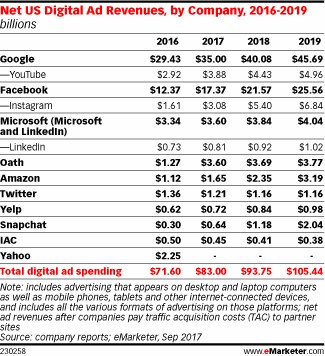In 2016, well before AT&T announced its intention to acquire giant media conglomerate Time Warner, CEO Randall Stephenson publicly prodded employees to reinvent the company or risk becoming another has-been in the media wars. Nearly two years later, the company fired the first salvo after closing the $85 billion takeover of Time Warner, the culmination of an epic 20-month antitrust court battle against the DoJ.
That move marked an unprecedented seismic shift for the media and technology world with the legacy telco carrier becoming a media titan that encompasses valuable brands such as CNN, HBO and TNT.
The strongest case for the gargantuan merger is that the deal hedges against a future in which the likes of Netflix, YouTube, ESPN streaming and Hulu become the first entry point for media consumers. The deal provides an answer to AT&T’s rating woes and the threat posed by cord-cutting and skinny bundles.
Digital Ad Spoils
Fresh off its Time Warner purchase, AT&T is hardly resting on its laurels, throwing its massive weight around by launching a new $15/mo skinny bundle called WatchTV, followed by the purchase of digital advertising technology company AppNexus in a $1.6 billion deal. AppNexus is one of the largest ad exchange companies in the world.
By buying AppNexus, AT&T has signaled its intention to follow in Verizon’s footsteps by squaring it off with the likes of Google and Facebook in digital advertising. In 2017, Verizon acquired Yahoo and AOL (now known as Oath). Verizon seems to be doing just fine with the purchase, with Oath being ranked as the 4th largest digital ad vendor.

(Click to enlarge)
Source: eMarketer
These recent acquisitions by telco giants point to a new modus operandi--create content and then distribute and sell it yourself. Related: The Dow Is Delirious
Just as Oath has successfully been able to gel AOL’s and Yahoo’s advertising technology and digital content operations, AT&T can leverage its advertising and analytics prowess with AppNexus’s massive distribution network to deliver a world-class advertising platform that brands and publishers can use to reach consumers in the market in a highly targeted manner.
Further, AT&T can potentially make more money selling targeted ads on its own products on DirectTV as well as on newly acquired channels--TNT, HBO and CNN.
TV ads tend not to be as well targeted as their digital peers. By marrying the two platforms, AT&T might be able to gain an edge over its Pay TV rivals and maybe earn premium rates for its ads.
Uphill Battle
To be fair, AT&T clearly has its work cut out trying to cut itself a niche in the highly competitive industry. The Google-Facebook duopoly control nearly 60 percent of online ad dollars, leaving hordes of other players feeding off scraps.
Further, owning a top-drawer channel like HBO is not enough to combat cord-cutting as Walt Disney investors will probably tell you. After remaining a top-performer for years, Disney shares have become laggards over the past two years thanks to the fact that ESPN continues to bleed subscribers profusely.
AT&T is lucky in that respect, though, because Time Warner had the presence of mind to launch HBO Now--a Netflix-esque online streaming--nearly four years ago. The channel now boasts more than five million subscribers.
AT&T shares have lost 17 percent in the year-to-date mainly due to the Time Warner merger. But with ~$30 billion in Time Warner annual revenues and ~$5 billion in profits, several potential new revenue streams and, of course, the juicy 6.2 percent dividend, the stock is looking like a bargain.
By Fred Dunkley for Safehaven.com
More Top Reads From Safehaven.com:
















